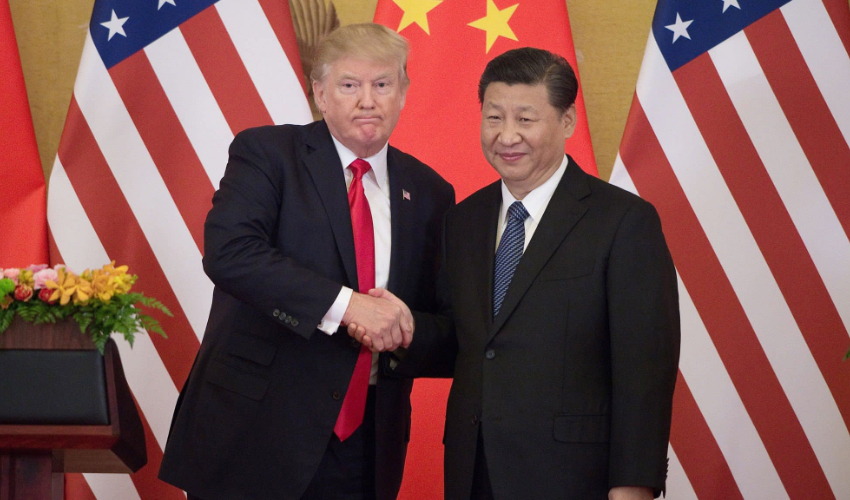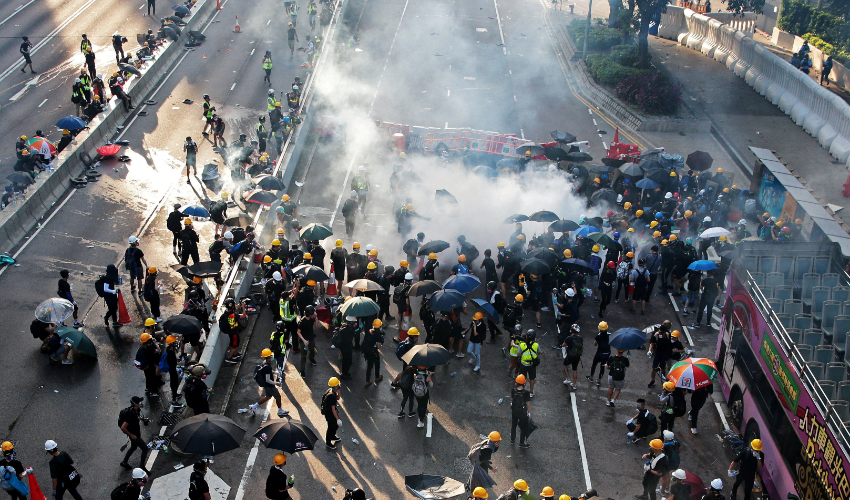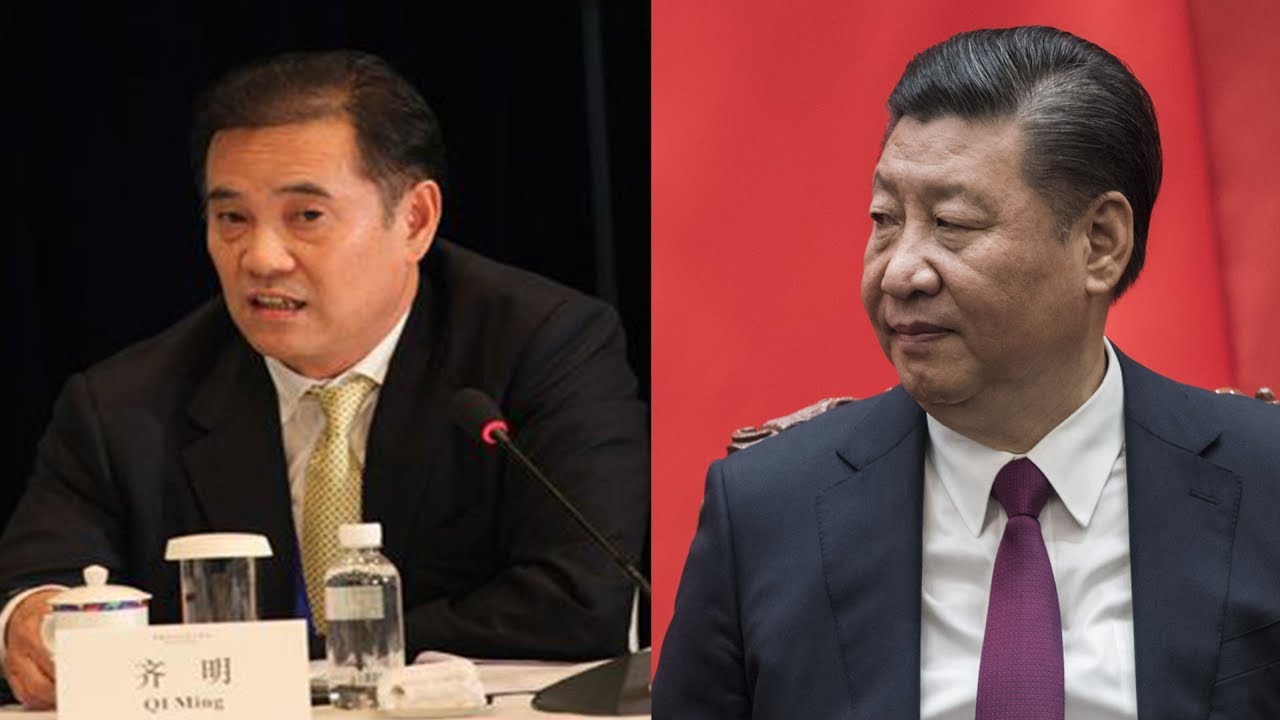Weekly Briefing: Tariff Man with no plan; Hong Kong; social credit — has the West got it wrong?


Hello, readers! The China Project Weekly Briefing details the most important China news from the past week. It also comes in the form of a free newsletter — sign up using the box at the top of our homepage.
~
“May you live in interesting times” goes the apocryphal ancient Chinese curse, but there is no better description of the age we live in for a China watcher. Our two top stories today both concern issues that the world will be dealing with, uncomfortably, for decades to come: America’s relationship with China, and how the democracy-hating Chinese government deals with Hong Kong people’s desire for political representation.
—The Editors
1. The Tariff Man with no plan

Photo credit: AFP
THE FOREVER TRADE WAR
We’ve called it that before, but it’s more true now than ever: There is no end in sight for the U.S.-China techno-trade conflict, more than a year after it started. The China Project marked July 6, 2018, as the start of the era of large-scale tariffs, which makes today day 397.
On August 1, Trump announced that the U.S. would impose 10 percent tariffs on $300 billion more in Chinese imports starting September 1, plunging U.S.-China relations into all-out trade war territory. The previous trade war escalations were all also initiated by Trump, who dubbed himself “Tariff Man” on day 152 of the trade war.
China has apparently responded to the latest escalation in two ways:
- Canceling purchases of soybeans and other crops that Trump had earlier cheered plans for, according to Bloomberg.
- Allowing its currency to devalue past the seven-yuan-to-the-dollar level, so its exporting firms face less price pressure, per the Wall Street Journal.
Trump fumed about the currency devaluation on Twitter this morning, and at about 6 p.m., the U.S. Treasury Department officially labelled China a currency manipulator.
After much hedging, Wall Street appears to be finally coming around to believing that we are headed toward an indefinite period of rockier U.S.-China trade relations. There was “a worldwide sell-off in markets,” reports CNN. “The Dow closed down 767 points, and the Nasdaq Composite — a proxy for the technology companies that will be most harmed by a trade war — suffered its longest losing streak since November 2016.”
IT’S THE POLITICS, STUPID
We would bet that the latest escalation has to do primarily with the 2020 election. Since the trade talks last broke down, in early May, Trump has tended to combine his talking points about China with attacks against his potential Democratic opponents, particularly former vice president Joe Biden. He most recently did this on July 30, as his negotiating team was in Shanghai.
- Trump has bipartisan support for a “tough on China” line. It’s one of the only areas where Democrats agree with him: Chuck Schumer, the top Democrat in the U.S. Senate, even said, “Being tough on China is the right way to be.”
- Trump will continue to have bipartisan support through 2020: When asked by Axios, all Democratic presidential candidates who staked out a position were also highly critical of China, and were also all indecisive about removing Trump’s tariffs if they were elected.
WHAT IF CHINA DOESN’T CAVE?
The rationale behind the previous escalations could be seen as primarily economic: Up the pressure on China, and Beijing will have no choice but to make concessions to regain a normal trading relationship.
- The problem was always that there is a huge amount of wishful thinking about the fragility of the Chinese economy — and its vulnerability to taxes on exports at foreign borders — behind this. The truth is that China has not been an export-dependent economy for many years, as economist Andy Rothman wrote.
- We take Trump seriously when he says that “if & when I win, the deal that they get will be much tougher than what we are negotiating now…or no deal at all.”
- We also take China seriously when the foreign ministry says, “China does not accept any maximum pressure, threat or blackmail. On major issues concerning our principles, we won’t back down even a little bit.”
Those two positions are incompatible. Tariffs haven’t worked for nearly 400 days. Why would they work now?
2. City-wide clashes in Hong Kong

Photo credit: Demonstrators disperse after a tear gas canister is fired by Hong Kong police in Harcourt Road, Admiralty / Reuters
It has been nearly two months since mass protests began in Hong Kong against an extradition bill, now shelved but not fully withdrawn, that threatened to connect the city’s judicial system with the opaque and Communist Party-controlled courts of mainland China.
- Today, thousands of workers went on strike, including more than 2,300 aviation workers, leading to “the cancellation of more than 100 flights to and from one of the world’s busiest airports,” according to CNN.
- The strike “escalated into city-wide skirmishes between protesters and riot police,” reports Hong Kong Free Press. Police said they have fired around 1,000 rounds of tear gas and 160 rubber bullets in the past two months.
- Beijing threw its support behind the Hong Kong government, while blaming “traitors” and foreign forces for the protests, and urging the city’s police to take “all necessary steps” to end the unrest.
- Beijing has also threatened military force to quash the protests, as on July 31 the Hong Kong garrison of the People’s Liberation Army released a militaristic propaganda video in which crowd control drills were interspersed with footage of missiles and snipers in action, as a soldier declared over a loudspeaker in Cantonese, “All consequences are your responsibility!”
3. Xi’s cousin, the high roller in Australian casinos

Photo credit: Ming Chai, left, and Xi Jinping, right.
With the strict information controls in China, it is extremely rare that the world gets a glimpse into the lives of family members of top Chinese leaders.
One of those rare stories was reported last week in an investigation of Australia’s Crown Casino, by the Australian 60 Minutes TV show and the newspapers The Age and Sydney Morning Herald. Amid a web of criminal activity, including, centrally, the illegal promotion of gambling in mainland China, the investigation found this:
- Ming Chai (齐明 Qí Míng), the cousin of Chinese President Xi Jinping, is a high roller at Crown Casino in Melbourne, Australia. Casino documents had him registered as a “VVIP” — someone who drops millions of dollars every year on the gambling tables.
- He holds an Australian passport and has registered a business address at a mansion in Melbourne.
- He was “aboard a private jet for high-roller gamblers when it was searched by federal agents on the Gold Coast in 2016 on suspicion that it was involved in international money laundering.”
To watch the section of the Australian 60 Minutes report about Ming Chai, click here. To read the whole investigation findings on Ming Chai in The Age, click here.
4. Social credit in China — has the West got it wrong?

Photo credit: A scene from the Black Mirror episode “Nosedive,” where the main character is denied a plane ticket because of her insufficient social credit score.
THE BLACK MIRROR COMPARISON
In October 2016, Netflix released the third season of its hit Black Mirror science fiction series, which opened with an episode that explored the implications of an all-encompassing social credit system. Practically every interaction that the main character has with other people is rated, and her relative “trustworthiness” affects everything from her apartment rent to options for transportation.
The episode, titled “Nosedive,” drew widespread comparisons to real-life social credit systems in China, such as Alibaba’s Sesame Credit.
A HISTORY OF MISREPORTING
WIRED has a new article called “How the West got China’s social credit system wrong,” which argues that these dystopic takes on China’s social credit system began before Black Mirror, and that they were wrong all along, because:
- “There is no single, all-powerful score assigned to every individual in China, at least not yet.”
- “Social credit” sounds different in English — where it is associated with interpersonal connections — than in Chinese — where it refers to a more general concept of “public trust.”
- China’s social credit systems are numerous, not unified, and many are experimental and run by private companies.
HOW DYSTOPIAN IS CHINA’S VERSION, REALLY?
Up until recently, WIRED published many stories on social credit that played to the dystopian Western vision of China’s systems. One featured article in 2017 was titled “In China, a three-digit score could dictate your place in society.” For a few more nuanced perspectives, see:
- The messy truth about social credit / Logic Magazine
- Mythbusting China’s social credit system / Sinica Podcast
- What do people in China think about ‘social credit’ monitoring? / Washington Post
5. Foreign soccer players get Chinese citizenship

Photo credit: John Hou Saeter.
China does not allow foreigners to become naturalized Chinese citizens. Or, it didn’t, until it started making exceptions this year, according to CNN:
- John Hou Saeter gave up his Norwegian citizenship in January to become a Chinese national.
- Nico Yennaris gave up his British passport at the same time, and moved to Beijing.
These two men are both soccer players, with Saeter now playing for Beijing Guoan with the name Hóu Yǒngyǒng 侯永永, and Yennaris joining Beijing Sinobo Guoan FC and playing with the name Lǐ Kě 李可. They also both have Chinese mothers.
Another foreign-born man, Pedro Delgado from Portugal, also became a naturalized Chinese citizen this year, according to the SCMP, though there were conflicting reports on whether he has Chinese heritage.
If the trend continues, these cases could be influential in shaping conceptions of what it means to be Chinese. We are very curious what these soccer players will do when they’re too old for the playing field.
~
The China Project Weekly Briefing is sent as a free newsletter every week — subscribe by entering your email into the box at the top of our homepage. To get daily roundups of China news, access to a members-only Slack channel and exclusive expert chats, and discounts on other The China Project events and products, sign up for The China Project Access today!





